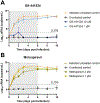The triple combination of Remdesivir (GS-441524), Molnupiravir and Ribavirin is highly efficient in inhibiting coronavirus replication in human nasal airway epithelial cell cultures and in a hamster infection model
- PMID: 39237005
- PMCID: PMC11560660
- DOI: 10.1016/j.antiviral.2024.105994
The triple combination of Remdesivir (GS-441524), Molnupiravir and Ribavirin is highly efficient in inhibiting coronavirus replication in human nasal airway epithelial cell cultures and in a hamster infection model
Abstract
The use of fixed dose-combinations of antivirals with different mechanisms of action has proven key in the successful treatment of infections with HIV and HCV. For the treatment of infections with SARS-CoV-2 and possible future epi-/pandemic coronaviruses, it will be important to explore the efficacy of combinations of different drugs, in particular to avoid resistance development, such as in patients with immunodeficiencies. This work explores the effect of a combination of 3 broad-spectrum antiviral nucleosides on the replication of coronaviruses. To that end, we made use of primary human airway epithelial cell (HAEC) cultures grown at the air-liquid interface that were infected with the beta coronavirus OC43. We found that the triple combination of GS-441524 (the parent nucleoside of remdesivir), molnupiravir and ribavirin resulted in a more pronounced antiviral efficacy than what could be expected from a purely additive antiviral effect. The potency of this triple combination was next tested in SARS-CoV-2 infected hamsters in a prophylactic setup. To that end, for each of the drugs, intentionally suboptimal or even ineffective doses were selected. Yet, in the lungs of all hamsters that received triple prophylactic therapy (but not in those that received the respective double combinations) no infectious virus was detectable. Our findings indicate that co-administration of approved drugs for the treatment of coronavirus infections should be further explored but also against other families of viruses with epidemic and pandemic potential for which no effective antiviral treatment is available.
Copyright © 2024 The Authors. Published by Elsevier B.V. All rights reserved.
Conflict of interest statement
Declaration of competing interest The authors declare that they have no known competing financial interests or personal relationships that could have appeared to influence the work reported in this paper.
Figures



Update of
-
The triple combination of Remdesivir (GS-441524), Molnupiravir and Ribavirin is highly efficient in inhibiting coronavirus replication in human nasal airway epithelial cell cultures and in a hamster infection model.bioRxiv [Preprint]. 2024 May 15:2024.05.14.594200. doi: 10.1101/2024.05.14.594200. bioRxiv. 2024. Update in: Antiviral Res. 2024 Nov;231:105994. doi: 10.1016/j.antiviral.2024.105994. PMID: 38798406 Free PMC article. Updated. Preprint.
References
-
- Abdelnabi R, Foo CS, Kaptein SJF, et al., 2021a. Molnupiravir (EIDD-2801) inhibits SARS-CoV-2 replication and enhances the efficacy of favipiravir in a Syrian hamster infection model. bioRxiv 2020. 10.1101/2020.12.10.419242, 12.10.419242. - DOI
-
- Abdelnabi R, Maes P, de Jonghe S, Weynand B, Neyts J, 2022a. Combination of the parent analogue of remdesivir (GS-441524) and molnupiravir results in a markedly potent antiviral effect in SARS-CoV-2 infected Syrian hamsters. Front. Pharmacol 13, 1072202 10.3389/fphar.2022.1072202. - DOI - PMC - PubMed
MeSH terms
Substances
Grants and funding
LinkOut - more resources
Full Text Sources
Miscellaneous

